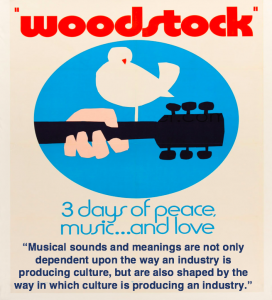Relationship Between Society and Music
In Keith Negus’s reading, Music Genres and Corporate Cultures, he points out how the music industry is not just a corporate space but a place for social relationships through which music is produced. These corporations must take strategic steps to make money and over time it has become easier for the music industry to see what music is the most popular and how to market to the right consumer through collected data and technology. When I came across the quote by Negus, “Musical sounds and meanings are not only dependent upon the way an industry is producing culture, but are also shaped by the way in which culture is producing an industry,” I couldn’t help but think about the 60’s and the 70’s where music was based on what was going on in society, such as the Vietnam War, and from that making music such as anti-war songs. Woodstock was a music festival that helped signal for protest so that is why I chose this image. This also connects to the keywords reading for taste, “studying taste in media means making connections between media and the audiences they address. The result is the analysis of not only texts and their forms and meanings but also their appeals to consumers, their cultural circulation, and their function within social structures.” There was a clear relationship in the late 60’s and early 70’s between the war, music and consumers and how music had a way of influencing people to make peace and because society circulated this music the music industry thrived. The song I included with this is John Lennon’s, “Imagine,” which was written in 1971 to send a message for world peace.
